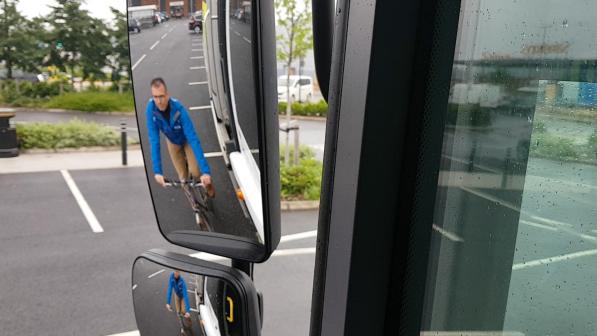Collaborating against unsafe HGVs

CTC has welcomed Transport for London's initiative in forming a new London Freight Enforcement Partnership. The partnership will involve TfL, the DVSA and London’s policing agencies in the joint intelligence-led targeting of rogue freight operators. The aim is to build on the work of TfL and other agencies including the Industrial HGV Task Force and Commercial Vehicle Units, which have carried out targeted inspections of vehicles and operating firms identified as non-compliant.
Initiatives like this are sorely needed. Earlier this year, CTC highlighted the failings in the system for regulating goods vehicle operators. This followed the tragic death of three cyclists in two separate incidents involving lorry drivers who should never have been behind the wheel of a commercial vehicle, and whose employers displayed scant if any regard to basic health and safety and employer diligence requirements.
Any initiatives which encourage agencies to co-operate and target enforcement at rogue haulage operators have to be welcomed.
Duncan Dollimore, Road Safety and Legal Campaigns Officer
Cyclist Alan Neve was killed in London in 2013, when he was run over by a tipper truck driven carelessly by Barry Meyer. Meyer had a string of previous driving convictions. However, the Transport Managers who hired him, Alan John Drummond and Colin Frank Drummond, had not bothered to check his driving licence to see if he was legally permitted to drive their vehicles. No investigation of the operator was commenced until after Meyer’s trial in April 2015, when the Transport Commissioner (TC) for London and the South East was notified by Transport for London (TfL) of the operator’s negligence. Alan’s death highlighted the failings in the system for notifying the TC of concerns regarding operators, with neither the police or the Driver Vehicle Standards Agency (DVSA) being under any obligation to do so.
Similar problems were evident following the deaths of cyclists Toby Wallace and Andrew McMenigall in Cornwall, just two weeks after Alan Neve's death. Lorry driver Robert Palmer drove straight into the rear of both cyclists after working back-to-back shifts for his employer Frys Logistics. It appears that the Transport Manager Mark Fry must have been content for Palmer to repair vehicles on one shift, and then to drive those vehicles on the subsequent shift, in an apparent breach of the spirit and intention of the tachograph regulations. Again, the TC was not immediately notified of the concerns regarding the operator, even though the TC had previously declined an application from Arthur Charles Fry to act as the firm's Transport Manager. A C Fry had lost his licence to operate in May 2010 when trading as A C Fry Transport. So Frys Logistics was set up with Mark Fry as its Transport Manager instead. More recently, Mark Fry was convicted and fined in June 2015 for tacograph offences which were uncovered during an investigation into Wallace and McMenigall's deaths. However, CTC has raised concerns with the TC that, to the best of our knowledge, the company has not been held to account for any offence directly relating to their deaths.
How this new partnership works in practice remains to be seen, but as CTC has been calling for agencies to share information relevant to road safety, improved communication and a system to ensure that the TC is immediately notified of concerns regarding operators, and a greater enforcement role for agencies such as the Health and Safety Executive (HSE), the concept of partnership working has to be welcomed.
This is however a London-only initiative. CTC has recently made submission to the Transport Committee Inquiry into road traffic law enforcement regarding notification systems, resourcing and the enforcement role of the TC and HSE. Hopefully, the new London Partnership will show that more co-ordinated and targeted enforcement can assist in addressing some of the failings in haulage licencing and enforcement demonstrated in these tragic cases, and help create the impetus for a change in approach nationally.

